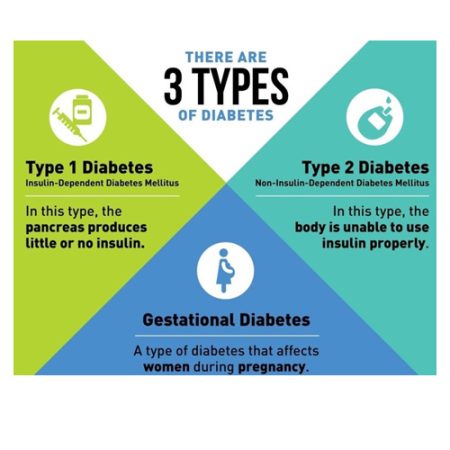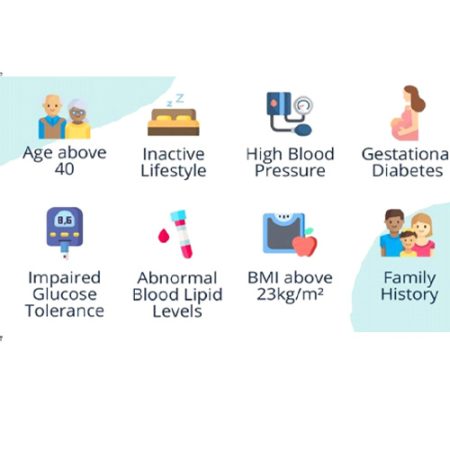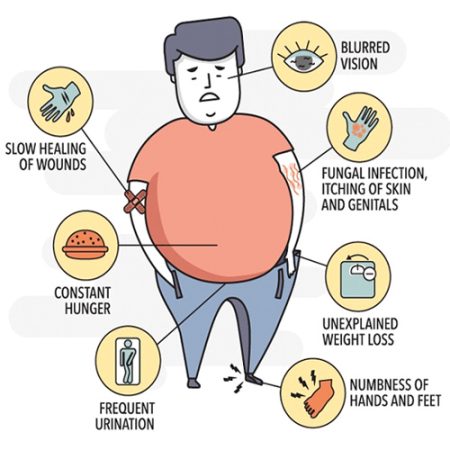DIABETES MANAGEMENT PROGRAMME
DIABETES MANAGEMENT PROGRAMME
- It is a disease in which the body’s ability to produce or respond to the hormone insulin is impaired, resulting in abnormal metabolism of carbohydrates and elevated levels of glucose in the
- Poorly controlled Diabetes can lead to serious consequences, causing damage to a wide range of your body’s organs and tissues – including your heart, kidneys, eyes and nerves.
- Diabetes is a chronic (long-lasting) health condition that affects how your body turns food into energy.
- Most of the food you eat is broken down into sugar (also called glucose) and released into your bloodstream. When your blood sugar goes up, it signals your pancreas to release insulin. Insulin acts like a key to let the blood sugar into your body’s cells for use as energy.
Types :-
Type 1 Diabetes
Type 1 Diabetes (previously known as insulin-dependent, juvenile or childhood-onset) is characterized by deficient insulin production and requires daily administration of insulin. Neither the cause of Type 1 diabetes nor the means to prevent it are known.
Symptoms :-
- Feeling hungry even after eating.
- Excessive excretion of urine.
- More thirst.
- Mood swings
- Belly pain
- Dehydration
- Weight Loss
Risk Factors :-
It is thought to be caused by an immune reaction (the body attacks itself by mistake). Risk factors for type 1 diabetes are not as clear as for prediabetes and type 2 diabetes. Known risk factors include:
- Family history: Having a parent, brother, or sister with type 1 diabetes.
- Age: You can get type 1 diabetes at any age, but it’s more likely to develop when you’re a child, teen, or young adult.

Type 2 Diabetes
Type 2 Diabetes (formerly called non-insulin-dependent, or adult-onset) results from the body’s ineffective use of insulin. The majority of people with Diabetes have type 2 diabetes. This type of diabetes is largely the result of excess body weight and physical inactivity.
Symptoms :-
Symptoms may be similar to those of type 1 Diabetes, but are often less marked. Some other symptoms are :-
- Type 2 Blood Sugar Symptoms in Women :-
- Painful Urination
- Irregular Periods
- Weight Gain
- Depression
- Type 2 Blood Sugar Symptoms in Men :-
- Skin Infection
- Vision Loss
- Slow Healing Wounds.
- Erectile Dysfunction.
- Frequent Urination
Risk Factors :-
You’re at risk for developing Type 2 diabetes if you:
- Have prediabetes
- Are overweight
- Are 45 years or older
- Have a parent, brother, or sister with type 2 diabetes
- Are physically active less than 3 times a week

Gestational Diabetes
Gestational Diabetes is hyperglycemia with blood glucose values above normal but below those diagnostic of Diabetes. Gestational diabetes occurs during pregnancy.
Women with gestational Diabetes are at an increased risk of complications during pregnancy and at delivery.
These women and possibly their children are also at increased risk of type 2 Diabetes in the future.
Risk Factors :-
You’re at risk for developing Gestational diabetes (Diabetes while pregnant) if you:
- Had gestational diabetes during a previous pregnancy
- Have given birth to a baby who weighed more than 9 pounds
- Are overweight
- Are more than 25 years old
- Have a family history of type 2 diabetes

Complications of Diabetes :-
· Nerve damage (neuropathy), that causes numbing and tingling that starts at toes or fingers then spreads.
· Kidney damage (nephropathy), that can lead to kidney failure or the need for dialysis or transplant.
· Eye damage (retinopathy), that can lead to blindness; cataracts, glaucoma.
· Foot damage including nerve damage, poor blood flow and poor healing of cuts and sores
· Skin infections
· Erectile dysfunction
· Hearing loss
· Depression
· Dementia
· Dental problems
Dietary management :-
- Eat a Balanced
- Moderate Your Sugar
- Moderate Your Consumption of Rice and Other
- Add fruits in your
- Limit Fat
- Moderate Your Alcohol Intake
- Eat small, regular meals
- Have a small snack between



